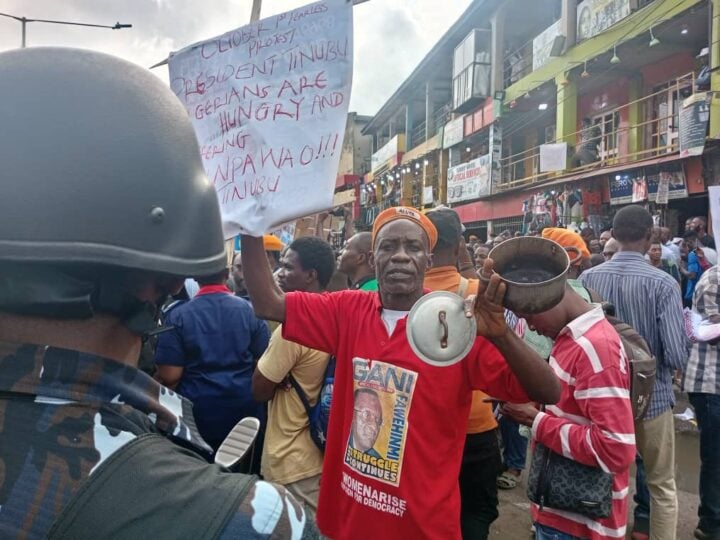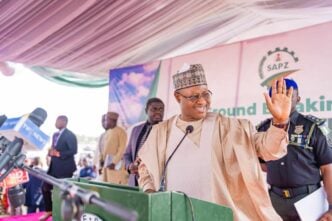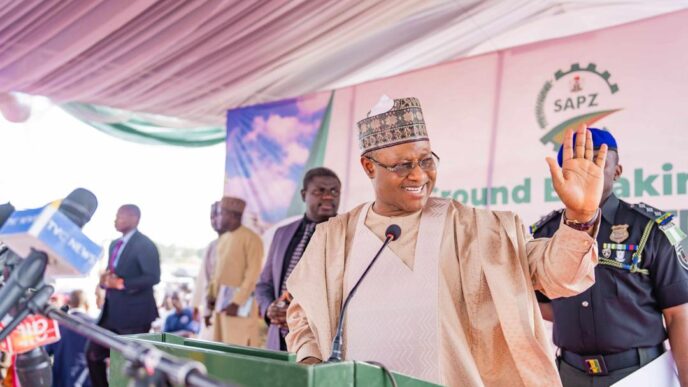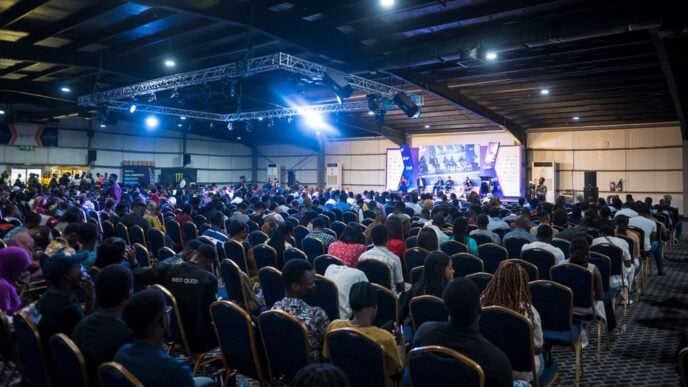A protest against economic hardship
BY FIDELIS NWAGWU
Following the assumption of office of Mr Kayode Egbetokun as the acting inspector general of Police (IGP) of Nigeria on 21 June, 2023, upon his appointment by President Bola Ahmed Tinubu, and his subsequent confirmation as the substantive IGP, he has been noted as undertaking a number of significant programmes aimed at reforming the Nigeria Police Force, enhancing national security, in addition to addressing internal and external challenges.
As much as progress has been made in tackling insecurity through efforts including the creation of a Special Intervention Squad, which comprises a standby unit of at least 1,000 officers per state, to tackle rising threats such as banditry and kidnapping, civil policing is one of the critical areas that continue to deserve attention, and which is rightly a vital subject of the IGP’s reform focus.
Nigeria certainly has a vibrant culture of protests – from the minor to more major ones – through which the public expresses its discontent with the policies, politics and activities of government – whether in response to the colonial authorities or even the native administrations that functioned at its behest, down to the different iterations of military rule and then civilian governments.
We had such early 20th Century eruptions as the Aba Women’s Riot of 1929 and the Abeokuta Women’s Revolt of 1947, to pushbacks to authoritarian rule as the Ali Must Go protest of 1978, Anti-SAP riots of 1989, followed by other major effusions like the June 12 protests of 1993, Occupy Nigeria in 2012, then the #EndSARS in 2020, and #EndBadGovernance protests in 2024.
Advertisement
The different interventions of the Nigerian Police to neutralise or contain many of these protests or instances of civil rights advocacy, drew diverse forms of criticism from human rights groups, activists and the general public. It was accussed of the excessive use of force (including the massive deployment of tear gas, live ammunition, water cannons and overwhelming physicality), arbitrary arrests and detentions (involving the holding of arrested protesters beyond the constitutional 48-hour limit before charging them), violent methods of crowd dispersal, intimidation through collaboration with other forces such as the military, alongside the unfair targeting of vulnerable groups such as women, youths and journalists, etc.
Much of the different elements comprising the approach of the Nigerian Police to ‘neutralising’ various acts of civil or public expression of discontent with government or governance – as alluded to above – have been traced to the manner it was set up, with roots in the 19th to 20th Century colonial administrations, which created it as a force or mechanism of brutal control/repression of natives who questioned the provenance of their authority. Hence the adversarial instinct and attitude of the Police to matters relating to the public, and particularly within its perception of how to execute its mandate of maintaining law and order, alongside the preservation of public safety, which is essentially an ethos of wielding the baton and stick, club and rifle. This approach essentially regards protests as threats to state authority, rather than legitimate expressions of civic rights.
Reforming into an Institution of Service
Advertisement
As part of the efforts at reforms, while the Police has been accused of a traditional, and subsisting, approach centred around violent crackdowns during periods of issues-based protests or other forms of civil rights advocacy, this approach is on the front-burner of crucial reformation by the Egbetokun leadership of the Police. As such, a newer approach being emplaced is one that necessarily seeks a comprehensive rule of law and human-rights focused reorientation, towards enhancing the capacity of the institution to protect citizens and improve public trust. This is through a more human-centred policing that equally signals the move from ‘force’ as the first line of response, to one fundamentally anchored on public service.
On the basis of global best practices, the human rights reorientation of the Nigerian Police involves extensive re-training and massive capacity-building on human rights and civil policing protocols. The re-training would include deep-diving into modules such as: Understanding Human Rights Frameworks, which would include newer interpretations of international human rights standards like the Universal Declaration of Human Rights (UDHR), the African Charter on Human and Peoples’ Rights, and the Nigerian constitution (particularly Chapter IV on Fundamental Rights). Officers will thus be primed to better understand the legal obligations to respect, protect, and fulfill rights like the freedoms of expression, assembly, and protection from torture.
Also, the training would emphasise the principles of necessity and proportionality, in line with the UN Basic Principles on the Use of Force and Firearms by Law Enforcement Officials, to deal with and re-engage issues including the use of excessive force and firearms in neutralising protests. In addition, de-escalation techniques, intergrating non-lethal alternatives, and strict protocols of firearms use.
More so, the consideration of arrest and detention procedures would require officers to be trained on the processes of lawful arrest, the rights of suspects (e.g. to silence, legal representation, and prompt presentation before a court), and the prohibition of arbitrary detention. These will equally address issues such as prolonged pre-trial detention and extortion, which have been widely condemned.
Advertisement
The foregoing training would address the necessity of banning torture as a means of obtaining evidence under international and Nigerian laws, and include practical guidance on humane treatment during interrogations and custody. Other aspects will include crowd control and public order management, in tandem with respecting the right to peaceful protest; sensitivity to gender and vulnerable groups (including the protection of children and the diabled, etc.); trauma informed policing; community policing and trust-building, etc.
Adopting Structural Reforms
Importantly, addressing the inadequacies of the protest management approach of the Nigerian Police Force (NPF) requires structural changes in the organisation, on the levels of accountability, funding, and leadership. As such, the Egbetokun reform effort must tackle the root causes of the deficiencies of the Nigerian Police, such as its colonial legacy, resource scarcity, and paucity of oversight, within the framework of Nigeria’s security needs and democratic aspirations.
On the level of accountability, documented abuses from major protests, such as #EndSARS and #EndBadGovernance, stems from sparse oversight and internal protections. Hence, some of the structural changes that should be made in this endeavour could include the drive at creating an independent oversight body – in alignment with the legislative and executive branches of the Federal Government – such as a Police Accountability Commission (PAC), which is separate from the Police Service Commission (PSC), and with the powers to investigate, prosecute, and recommend disciplinary actions for officers involved in misconduct. This body should include civilians, legal experts, and human rights advocates, while it is funded directly from the federal budget.
Advertisement
There would also be the need to deploy accountability tools like mandatory body cameras to be worn by Police officers involved in operations, as part of a process of transparency in civil policing, with the footage from these cameras uploaded automatically in a centralised database that can be accessed by the proposed PAC, courts, and other relevant organs. Equally, patrol units should be monitored through real-time GPS tracking.
Moreover, there is the need to establish a decentralised complaint system through a state-level civilian complaint boards, which is linked to the PAC, and which can take the complaints of citizens about abuses anonymously, whether through mobile apps, in local offices, or other designated points. In addition, the Police Act 2020 should be amended as part of reforms to enable annual external audits of NPF operations annually, with the results being debated in the National Assembly and released publicly.
Advertisement
Very saliently, the elephant in the room – in all this – has been the chronic underfunding of the Police, evident in the operative 1:650 ratio of police officers to citizens (below the UN standard of 1:450), the deteriorated infrastructure of the NPF, and with serious consequences for the issue of efficiency and corruption in the Force.
The lack of adequate men on ground impacts the proper management of protests – with implications for human rights sensitivity, as there would always be the overarching recourse to the use of force and firearms to contain protests, in the absence of a critical mass of Police officers trained in the techniques of de-escalating situations that could easily deteriorate into violence.
Advertisement
To resolve this, a vital consideration would be the expansion of the Nigeria Police Trust Fund (NPTF) through an increase to 1 per cent of the federal revenue, from the present 0.5 per cent. This could then bump up funding to close to the required sum of N1.25 trillion that IGP Egbetokun had earlier sought for effective national policing for 2025. Still, this should be taken on alongside other models of funding – including international partnerships – towards enhancing policing operations, in a manner that’s more reflective and cognisant of human and people’s rights.
The foregoing – and more – are some of the very critical reforms that IGP Egbetokun has been noted as trying to pull through, despite structural obstacles and age-long embedded attitudes within both the police and political bureaucracies that appear to be cynical to bold efforts at change, or which consider these with other intentions in mind, when it is not being oushed as a half-hearted effort at public appeasement in moments of criticisms.
Advertisement
One can only sincerely hope that Egbetokun keeps up with a steady hand and a firm resolve to achieve these desperately needed reforms that he has initiated and which would revolutionise the police force into a vastly more efficient service if implemented and achieved. Then, respect for human and people’s rights will become cardinal aspects of the operations of a Nigerian Police not fundamentally sutured to force!
Nwagwu writes from Abuja.
Views expressed by contributors are strictly personal and not of TheCable.




